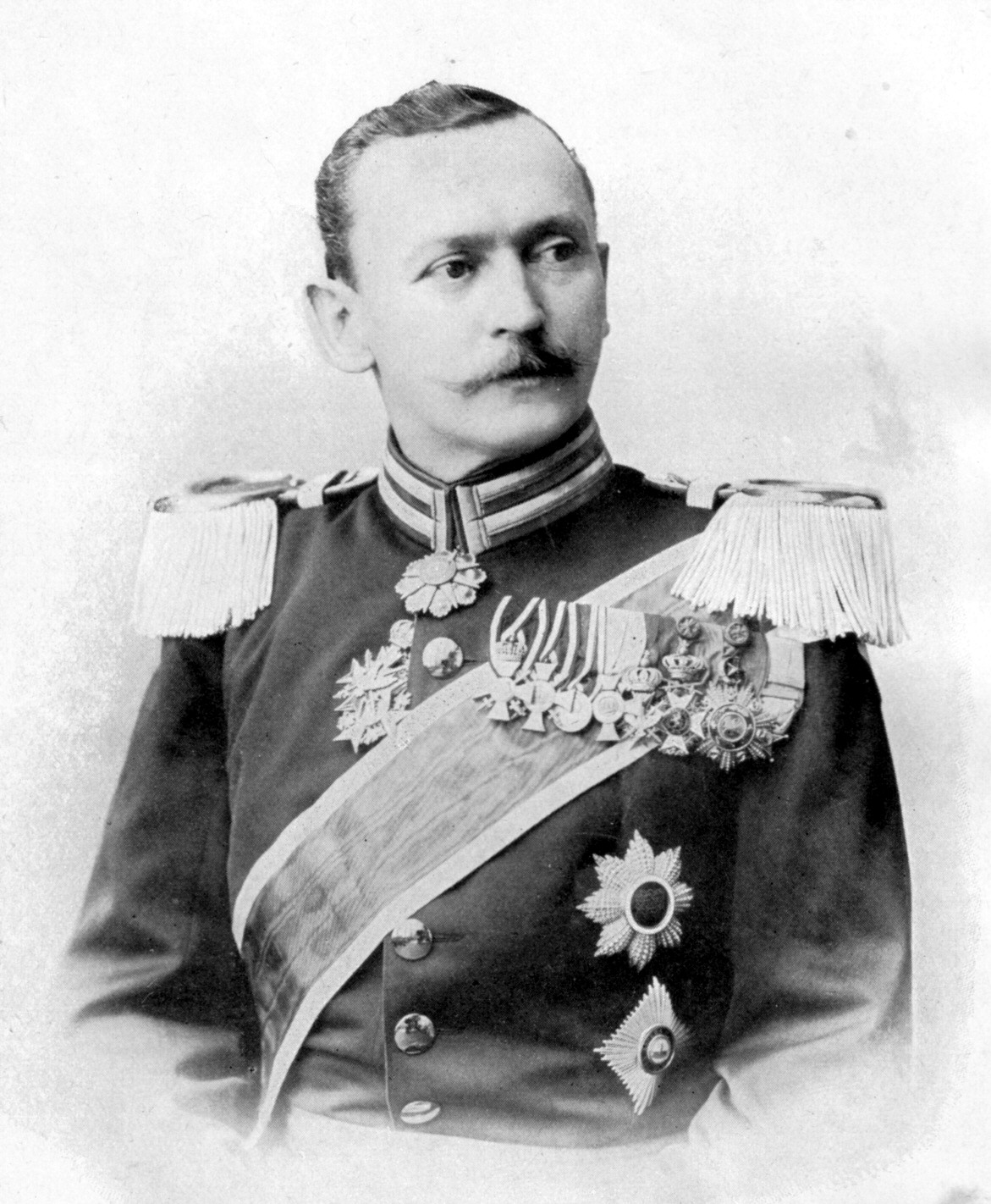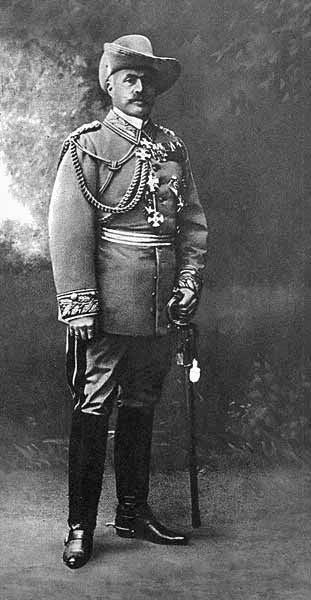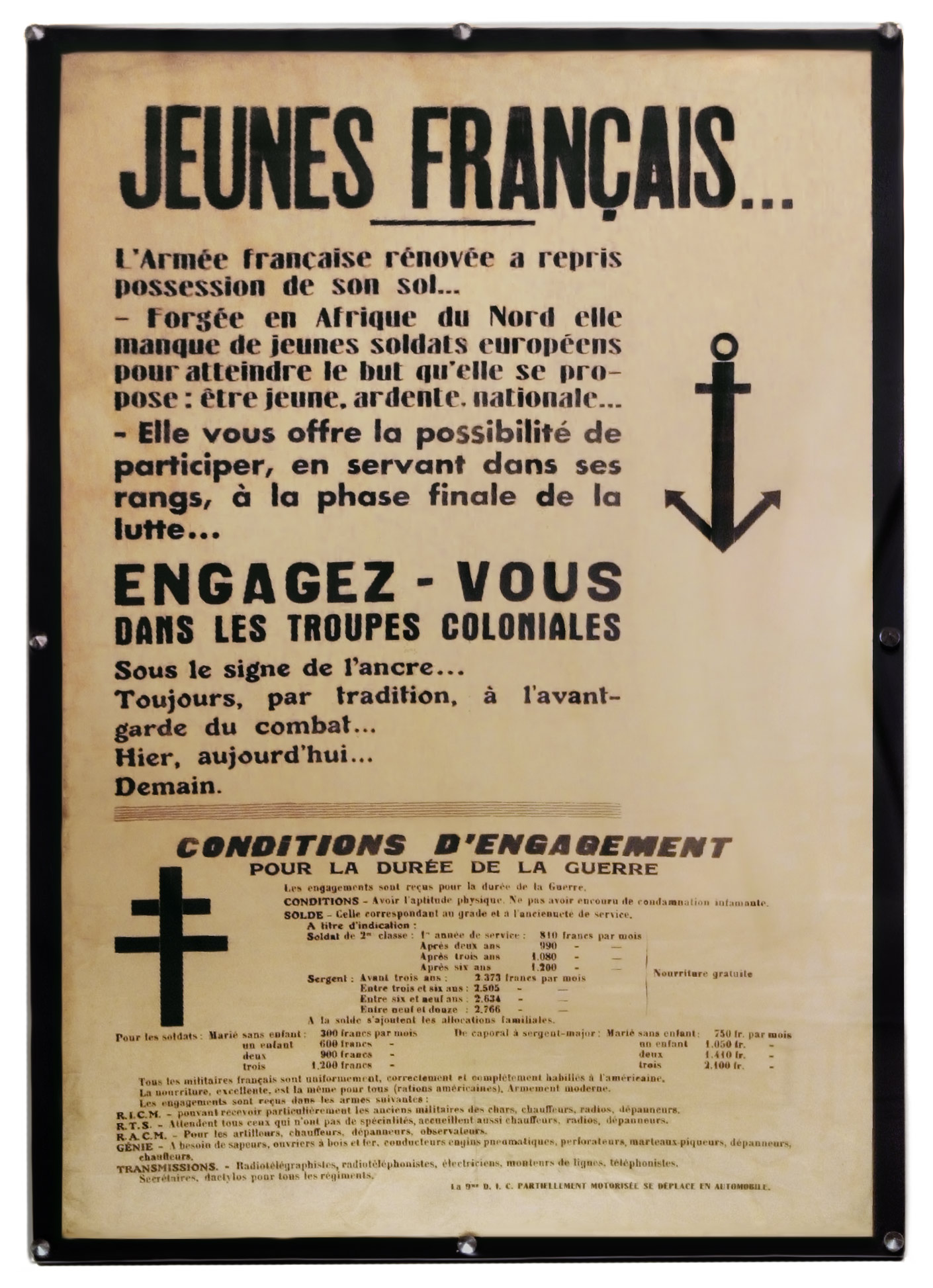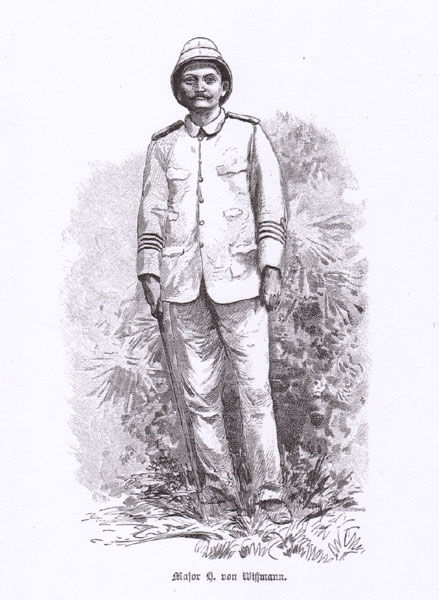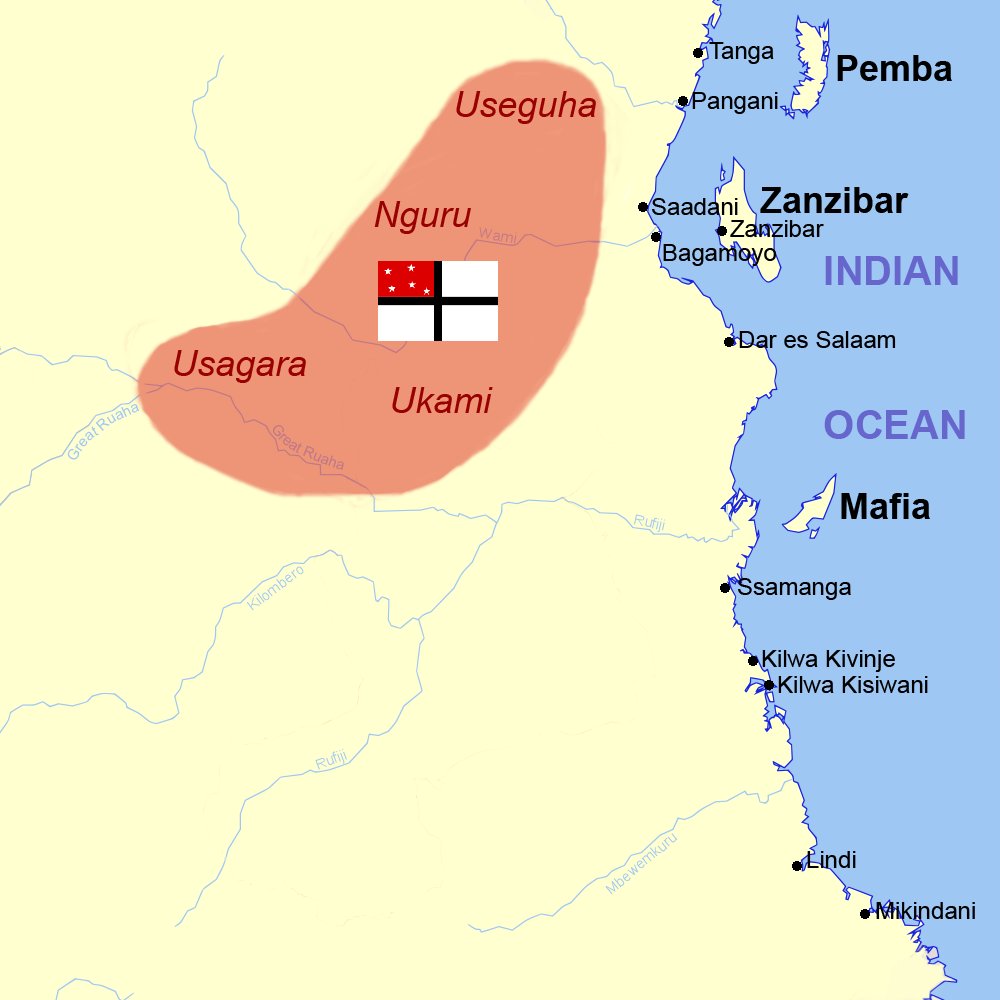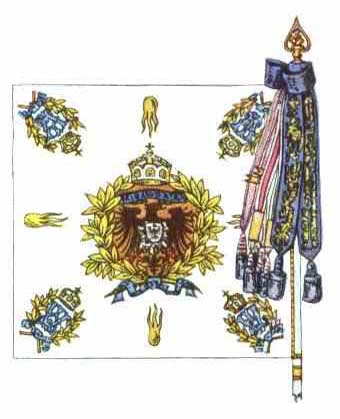|
Schutztruppe
(, Protection Force) was the official name of the colonial troops in the African territories of the German colonial empire from the late 19th century to 1918. Similar to other colonial armies, the consisted of volunteer European commissioned and non-commissioned officers, medical and veterinary officers. Most enlisted ranks were recruited from indigenous communities within the German colonies or from elsewhere in Africa. Military contingents were formed in German East Africa, where they became famous as , in the Kamerun colony of German West Africa, and in German South West Africa. Control of the German colonies of New Guinea, in Samoa, and in Togoland was performed by small local police detachments. Kiautschou in China under Imperial Navy administration was a notable exception. As part of the East Asian Station the navy garrisoned Tsingtao with the marines of III, the only all-German unit with permanent status in an overseas protectorate. Deployment The name of the Germa ... [...More Info...] [...Related Items...] OR: [Wikipedia] [Google] [Baidu] |
Battle Of Maroua–Miskin
The Adamawa Wars (1899-1907) were initially a series of military expeditions and border conflicts between the German Schutztruppe in Kamerun and the Fula Sunni Muslim states and tribes that were a part of the Sokoto Empire (a Caliphate formed during the Fulani Jihad), particularly the Emirate of Adamawa in the northern half of the region. After these territories were annexed major resistance continued for years and several uprisings occurred. Background The territories to the north of the portion of Kamerun under direct German control were part of either the Sokoto or Bornu Empires, which along with the Ottoman Empire were the worlds last remaining Caliphates. While the power of Bornu to resist was weakened after its temporary conquest by the Sudanese warlord Rabih az-Zubayr, Sokoto remained intact. Sokoto was an Islamic empire that controlled semi-autonomous emirates, the largest being Adamawa. By 1890 Adamawa was weakened by internal struggle, as a Mahdist state had develop ... [...More Info...] [...Related Items...] OR: [Wikipedia] [Google] [Baidu] |
German South West Africa
German South West Africa (german: Deutsch-Südwestafrika) was a colony of the German Empire from 1884 until 1915, though Germany did not officially recognise its loss of this territory until the 1919 Treaty of Versailles. With a total area of 835,100 km², it was one and a half times the size of the mainland German Empire in Europe at the time. The colony had a population of around 2,600 Germans. German rule over this territory was punctuated by numerous rebellions by its native African peoples, which culminated in a campaign of German reprisals from 1904 to 1908 known as the Herero and Namaqua genocide. In 1915, during World War I, German South West Africa was invaded by the Western Allies in the form of South African and British forces. After the war its administration was taken over by the Union of South Africa (part of the British Empire) and the territory was administered as South West Africa under a League of Nations mandate. It became independent as Namibia on 21 ... [...More Info...] [...Related Items...] OR: [Wikipedia] [Google] [Baidu] |
Herero And Namaqua Genocide
The Herero and Namaqua genocide or the Herero and Nama genocide was a campaign of ethnic extermination and collective punishment waged by the German Empire against the Herero (Ovaherero) and the Nama in German South West Africa (now Namibia). It was the first genocide of the 20th century, occurring between 1904 and 1908. In January 1904, the Herero people, who were led by Samuel Maharero, and the Nama people, who were led by Captain Hendrik Witbooi, rebelled against German colonial rule. On January 12, they killed more than 100 German settlers in the area of Okahandja, although women, children, missionaries and non-German Europeans were spared. In August, German General Lothar von Trotha defeated the Ovaherero in the Battle of Waterberg and drove them into the desert of Omaheke, where most of them died of dehydration. In October, the Nama people also rebelled against the Germans, only to suffer a similar fate. Between 24,000 and 100,000 Hereros and 10,000 Nama died in the g ... [...More Info...] [...Related Items...] OR: [Wikipedia] [Google] [Baidu] |
German Colonial Empire
The German colonial empire (german: Deutsches Kolonialreich) constituted the overseas colonies, dependencies and territories of the German Empire. Unified in the early 1870s, the chancellor of this time period was Otto von Bismarck. Short-lived attempts at colonization by individual German states had occurred in preceding centuries, but Bismarck resisted pressure to construct a colonial empire until the Scramble for Africa in 1884. Claiming much of the left-over uncolonized areas of Africa, Germany built the third-largest colonial empire at the time, after the British and French. The German Colonial Empire encompassed parts of several African countries, including parts of present-day Burundi, Rwanda, Tanzania, Namibia, Cameroon, Gabon, Congo, Central African Republic, Chad, Nigeria, Togo, Ghana, as well as northeastern New Guinea, Samoa and numerous Micronesian islands. Including mainland Germany, the empire had a total land area of 3,503,352 square kilometers and pop ... [...More Info...] [...Related Items...] OR: [Wikipedia] [Google] [Baidu] |
Curt Von François
Curt Karl Bruno von François (2 October 1852 – 28 December 1931) was a German geographer, cartographer, Schutztruppe officer and commissioner of the imperial colonial army of the German Empire, particularly in German South West Africa (today's Namibia) where he was responsible on behalf of Kaiser for the foundation of the city of Windhoek on 18 October 1890 and the harbor of Swakopmund on 4 August 1892. Life François was born in Luxembourg of French Huguenot ancestry. He was the son of Prussian general Bruno von François, who was killed in the battle of Spicheren. Curt's younger brother Hermann von François (1856–1933) served as a general in World War I and was one of the key contributors to the German victory at the 1914 Battle of Tannenberg. The writer Louise von François was his aunt. Like his ancestors, young Curt von François joined the Prussian Cadet Corps. He served as a soldier in the Franco-Prussian War of 1870–71, whereby his father was killed in actio ... [...More Info...] [...Related Items...] OR: [Wikipedia] [Google] [Baidu] |
Colonial Troops
Colonial troops or colonial army refers to various military units recruited from, or used as garrison troops in, colonial territories. Colonial background Such colonies may lie overseas or in areas dominated by neighbouring land powers such as Imperial China or Tsarist Russia. Colonial troops have been used by Imperial powers whether ancient (such as Carthage and Rome), or modern (such as Great Britain, France, Netherlands, Denmark, the United States, Germany, Italy, Japan, Spain, and Portugal). Sometimes they have been recruited under local leaders, as auxiliaries; and at other times organised directly by the colonial power. Origins At the beginning of the modern colonial period such troops were predominantly Europeans from the home army of the country concerned, but locally raised "native" troops were soon recruited. The latter normally served in separate units, at first under their own leaders, later under European officers. The sepoys of the East India Company were a ... [...More Info...] [...Related Items...] OR: [Wikipedia] [Google] [Baidu] |
German East Africa
German East Africa (GEA; german: Deutsch-Ostafrika) was a German colony in the African Great Lakes region, which included present-day Burundi, Rwanda, the Tanzania mainland, and the Kionga Triangle, a small region later incorporated into Mozambique. GEA's area was , which was nearly three times the area of present-day Germany and double the area of metropolitan Germany at the time. The colony was organised when the German military was asked in the late 1880s to put down a revolt against the activities of the German East Africa Company. It ended with Imperial Germany's defeat in World War I. Ultimately GEA was divided between Britain, Belgium and Portugal and was reorganised as a mandate of the League of Nations. History Like other colonial powers the Germans expanded their empire in the Africa Great Lakes region, ostensibly to fight slavery and the slave trade. Unlike other imperial powers, however they never formally abolished either slavery or the slave trade and preferre ... [...More Info...] [...Related Items...] OR: [Wikipedia] [Google] [Baidu] |
Hermann Wissmann
Hermann Wilhelm Leopold Ludwig Wissmann, after 1890 Hermann von Wissmann (4 September 1853 – 15 June 1905), was a German explorer and administrator in Africa. Early life Born in Frankfurt an der Oder, Wissmann was enlisted in the Army in 1870 and was commissioned a Lieutenant four years later. Wissmann served Mecklenburg in Füsilierregiment No. 90 posted at Rostock. During this time he had to serve a four-month prison sentence for wounding an opponent in a duel. An 1879 chance meeting with the explorer Dr. Paul Pogge changed his life. Africa Granted a leave of absence from the army, in 1880, Wissmann accompanied explorer Paul Pogge on a journey through the Congo Basin. In the eastern Congo, Pogge and Wissmann parted company. Pogge stayed to build an agricultural research station for a Congolese chief, while Wissmann trekked to the Indian Ocean via present-day Tanzania. He was awarded the 1888 Founder's Medal of the Royal Geographical Society for his explorations. Afterward ... [...More Info...] [...Related Items...] OR: [Wikipedia] [Google] [Baidu] |
Askari
An askari (from Somali, Swahili and Arabic , , meaning "soldier" or "military", which also means "police" in the Somali language) was a local soldier serving in the armies of the European colonial powers in Africa, particularly in the African Great Lakes, Northeast Africa and Central Africa. The word is used in this sense in English, as well as in German, Italian, Urdu and Portuguese. In French, the word is used only in reference to native troops outside the French colonial empire. The designation is still in occasional use today to informally describe police, gendarmerie and security guards. During the period of the European colonial empires in Africa, locally recruited soldiers designated as askaris were employed by the Italian, British, Portuguese, German and Belgian colonial armies. They played a crucial role in the conquest of the various colonial possessions, and subsequently served as garrison and internal security forces. During both World Wars, askari units also served ... [...More Info...] [...Related Items...] OR: [Wikipedia] [Google] [Baidu] |
German East Africa Company
The German East Africa Company (german: Deutsch-Ostafrikanische Gesellschaft, abbreviated DOAG) was a chartered colonial organization which brought about the establishment of German East Africa, a territory which eventually comprised the areas of modern Tanzania, Burundi, and Rwanda. The Company originated in 1884 as the ( Society for German Colonisation) with the aim of trading in Africa. The German protectorate of Wituland (within modern Kenya) originated as a separate German sphere of influence in 1885. In April of the same year, the company leased the coastal strip opposite Zanzibar from Sultan Khalifa bin Said for 50 years. Its attempt to take over the administration led to a general revolt along the coast of what is now Tanzania. The company could only hold Dar es Salaam and Bagamoyo with the help of the German navy. In 1889 it had to request the assistance of the German government to put down the rebellion. In 1891, after it became apparent that the company could not ha ... [...More Info...] [...Related Items...] OR: [Wikipedia] [Google] [Baidu] |
Abushiri Revolt
The Abushiri revolt, also known as the slave trader revolt (german: Sklavenhändlerrevolte), was an insurrection in 1888–1889 by the Arab and Swahili population of the areas of the coast of East Africa that were granted, under protest, to Germany by the Sultan of Zanzibar in 1888. It was eventually suppressed by a German expeditionary corps which conquered the coastal area. Background In late 1884, an expedition of the Society for German Colonization, led by Carl Peters, had reached Zanzibar and made the local chiefs on the opposite mainland sign "protection contracts" promising vast areas to his organisation. Once it had gained a foothold, Peters' new German East Africa Company acquired further lands in Tanganyika up to the Uluguru and Usambara Mountains. That met with opposition by Sultan Barghash bin Said of Zanzibar, who nevertheless had to give in after Peters had reached the official support by the Foreign Office in Berlin and a fleet of the ''Kaiserliche Marine'' und ... [...More Info...] [...Related Items...] OR: [Wikipedia] [Google] [Baidu] |
Seebataillon
''Seebataillon'' (plural ''Seebataillone''), literally "sea battalion", is a German term for certain troops of naval infantry or marines. It was used by the Prussian Navy, the North German Federal Navy, the Imperial German Navy, the Austro-Hungarian Navy, the ''Kriegsmarine'', and briefly in the ''Bundesmarine''. In 2014, also the modern German Navy established a naval force protection unit called ''Seebataillon''. Establishment and history Kingdom of Prussia The first ''Seebataillon'' was organized on 13 May 1852 as the Royal Prussian ''Marinier-Korps'' at Stettin. This formation provided small contingents of marines to perform traditional functions such as protecting officers, general policing aboard warships and limited amphibious shore intrusions. The ''Seebataillon'' in 1870 had a strength of 22 officers and 680 non-commissioned officers and men. Battalion headquarters was then located at Kiel. German Empire After the establishment of the German Empire in 1871, Chancel ... [...More Info...] [...Related Items...] OR: [Wikipedia] [Google] [Baidu] |
